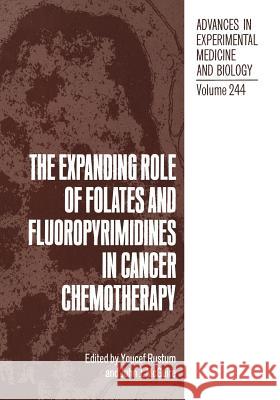The Expanding Role of Folates and Fluoropyrimidines in Cancer Chemotherapy » książka
The Expanding Role of Folates and Fluoropyrimidines in Cancer Chemotherapy
ISBN-13: 9781468456097 / Angielski / Miękka / 2012 / 336 str.
Although 5-fluorouracil (Fura) is the drug of choice for the treat ment of patients with advanced colorectal cancer, this agent has limited effectiveness with a reported response rate of 10-20% and a duration of response of only 6-9 months. The large percentage of treatment failures with this agent has spurred a continuing effort to delineate the mechanism(s) of resistance to Fura and to evaluate approaches that would selectively modulate the therapeutic efficacy of this agent. The therapeutic efficacy of FUra has been attributed to its selec tive incorporation into RNA and to its inhibition of thymidylate syn thase, leading to potent inhibition of DNA synthesis. Studies of cell lines in vitro and model systems in vivo have demonstrated that although mechanism sensitivity and resistanc; to Fura are multifactorial, in the presence of citrovorum factor (CF, 5-formyltetrahydrofolate) the site of action of Fura becomes predominantly the pronounced and pro longed inhibition of thymidylate synthase. This action is the result of stabilization of the covalent ternary complex between FdUMP, an active metabolite of FUra, 5,10-methylenetetrahydrofolates, and thymidylate synthase. This effect of CF is thus an example of the concept of meta bolic modulation.











